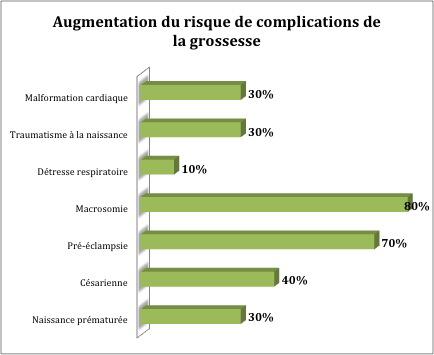Babies whose mothers developed diabetes during pregnancy are at greater risk for complications. Childbirths tend to occur earlier.

It’s a bit of a double penalty for mothers who develop diabetes during pregnancy. The gestational form of this metabolic disorder promotes complications for the fetus. A study by the Assistance Publique – Hôpitaux de Paris (AP-HP), based on health insurance data, provides an overview of the extent of the risk. She delivers in Diabetologia, a precise idea of the repercussions which the unborn baby may suffer, from its development until delivery.
A risky pregnancy
To reach these conclusions, the authors analyzed data on 796,000 deliveries that occurred in 2012 in the country. 7% of expectant mothers had gestational diabetes. The vast majority of them were able to control blood sugar levels by changing their eating habits (75%).
Compared to women whose blood sugar has remained normal, those who suffer from gestational diabetes are more exposed to high blood pressure during pregnancy (70%) but also to premature births and delivery by cesarean section. The fetus also pays the price for this hyperglycemia: there is more respiratory distress, birth trauma and heart defects in babies.

Blood sugar involved
Not surprisingly, the likelihood of seeing a complication is higher when the mother needs to be given insulin. Researchers explain this as more serious and difficult to control diabetes, which results in changes in blood sugar.
But this balance of power is reversed when the researchers tighten the sample. By analyzing only term births, they observe an increased risk of stillbirth when diabetes is treated with diet. According to the authors, prolonged exposure to hyperglycemia is involved. This is because women taking insulin generally give birth earlier.
But compared to women whose diabetes precedes pregnancy, this risk is negligible. When type 2 diabetes is present at the time of conception, babies are two to four times more likely to have complications. All the same, these remain infrequent.

Tailor-made screening
Despite repeated requests from the medical community, screening for gestational diabetes is not systematic in France. It has been recommended since 2010 in the presence of certain risk factors: overweight, a family or personal history, complications arising from previous pregnancies or macrosomia (birth weight greater than 4 kg).
Gestational diabetes develops during pregnancy, most often during the 2e trimester. This is because the placenta begins to produce hormones that can cause insulin resistance. This results in an increase in glucose in the blood.
.

















